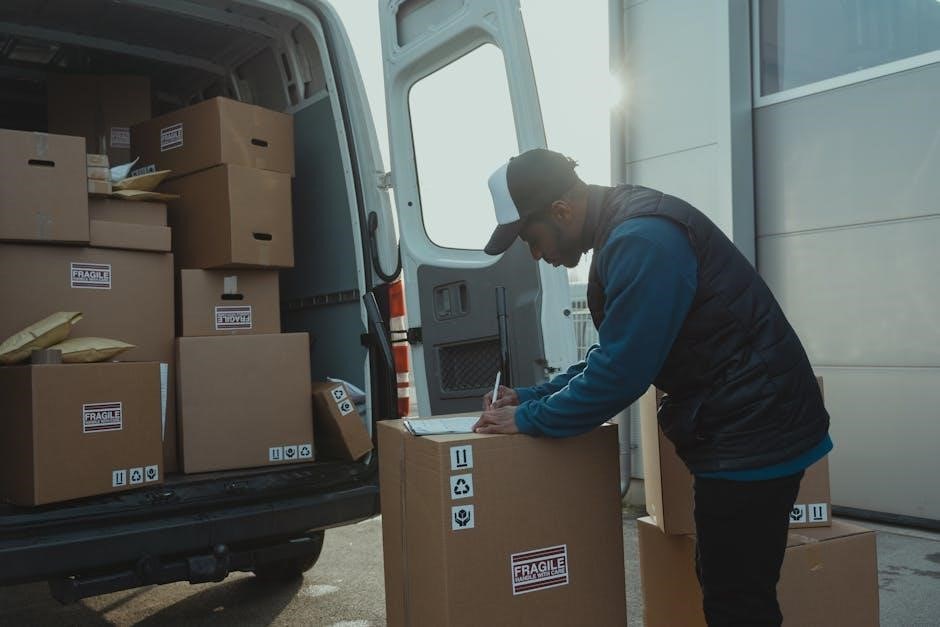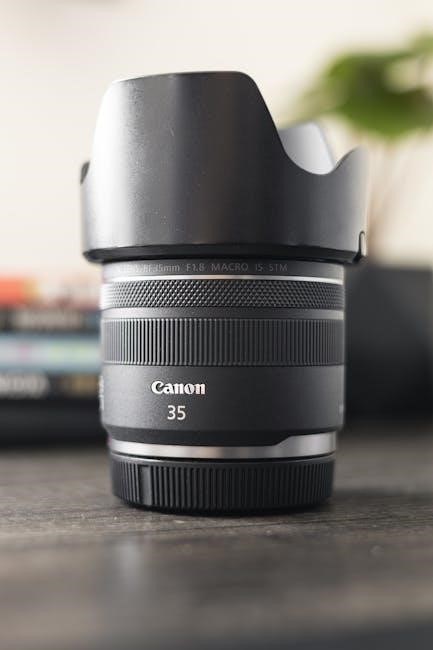The Missouri Commercial Drivers Manual is a comprehensive guide essential for aspiring commercial drivers․ It covers state-specific rules, safety practices, and licensing requirements․ The manual is a primary resource for understanding the regulations and skills needed to operate commercial vehicles safely and efficiently in Missouri․ It is designed to help individuals prepare for the CDL written and skills tests, ensuring they meet all state and federal standards․ Formal training, combined with this manual, is the best approach to becoming a professional commercial driver․
Overview of the Manual
The Missouri Commercial Drivers Manual provides a detailed guide to obtaining a CDL, covering licensing requirements, state and federal rules, safe driving practices, and vehicle inspections․ It serves as a primary resource for preparing for CDL tests and understanding the regulations for operating commercial vehicles in Missouri․ Available for free download, it is essential for both new and experienced drivers to stay compliant with state and federal standards․
Importance of the Manual for Aspiring Commercial Drivers
The Missouri Commercial Drivers Manual is a vital tool for aspiring commercial drivers, providing essential information on state-specific laws, safety practices, and licensing requirements․ It equips drivers with the knowledge needed to pass CDL tests and operate commercial vehicles responsibly․ The manual is a free, accessible resource that ensures compliance with regulations and promotes safe driving habits․

Eligibility Criteria for Obtaining a CDL in Missouri
Obtaining a CDL in Missouri requires meeting specific age, medical, and legal standards; Applicants must be at least 21 years old and pass a medical certification process․
Age Requirements
In Missouri, you must be at least 21 years old to apply for a CDL․ This ensures drivers have the necessary maturity and experience to operate large commercial vehicles safely on public roads․
Medical Standards and Certification
Commercial drivers must meet strict federal medical standards․ A DOT physical exam is required to ensure drivers are physically qualified to operate a commercial vehicle safely․ Vision, hearing, blood pressure, and overall health are evaluated; A valid Medical Examiner’s Certificate must be maintained to keep the CDL active․ Renewal is typically required every two years․
Disqualifications and Restrictions
Certain offenses can disqualify or restrict CDL privileges․ These include DUI convictions, reckless driving, and serious traffic violations․ Medical conditions that impair driving ability may also lead to disqualification․ Criminal offenses, such as vehicular manslaughter, can result in permanent CDL suspension․ The severity of the offense determines the duration of the disqualification period․
Classes of Commercial Driver’s Licenses (CDLs)
Missouri offers three CDL classes: Class A, B, and C, each requiring specific qualifications and authorizing operation of different commercial vehicle types and weights․
Class A CDL
A Class A CDL in Missouri allows operation of combination vehicles with a GVWR of 26,001 pounds or more, towing a unit over 10,000 pounds․ It is required for driving tractor-trailers and large rigs․ Applicants must meet medical standards, hold a valid medical certificate, and pass a skills test․ The manual details these requirements and helps prepare for the exam․
Class B CDL
A Class B CDL in Missouri is for operating heavy straight trucks and buses with a GVWR of 26,001 pounds or more․ It excludes trailers over 10,000 pounds․ Applicants must pass a skills test and meet medical standards․ The manual provides detailed information on requirements and preparation for obtaining this license, ensuring safe and lawful operation of such vehicles․
Class C CDL
A Class C CDL in Missouri allows operation of vehicles under 26,001 pounds, including passenger buses and Hazmat transport․ It requires a valid Missouri driver’s license, passing medical exams, and completing specific tests․ The manual details requirements and preparation steps, ensuring compliance with state and federal regulations for safe operation․
Steps to Obtain a CDL in Missouri
To obtain a CDL in Missouri, applicants must meet eligibility criteria, submit an application, pass required tests, pay fees, and complete training if necessary․
Application Process
The application process for a Missouri CDL begins with submitting a completed application to the Department of Revenue․ Applicants must provide proof of identity, residency, and legal status․ They must also pass a vision test and meet medical certification requirements․ The application can be accessed online or at a local licensing office․
Fees and Payments
Fees for a Missouri CDL vary based on the license class and duration․ The standard CDL license fee is $61․50 for a 6-year license․ Additional fees may apply for endorsements, such as $10 for a hazmat endorsement․ Payments can be made via cash, check, or credit card at the licensing office․ Fees are subject to change, so applicants should verify current rates․
Required Tests and Examinations
To obtain a CDL in Missouri, applicants must pass both a written test and a skills test․ The written test covers traffic laws, safety rules, and vehicle-specific knowledge․ The skills test evaluates pre-trip inspections, basic vehicle control, and on-road driving abilities․ Additional medical certification is required to ensure physical fitness for operating commercial vehicles safely and effectively․
The CDL Written Test
The CDL written test is a comprehensive assessment covering Missouri traffic laws, safety regulations, and vehicle-specific knowledge․ It evaluates your understanding of commercial driving rules and practices․
Topics Covered in the Written Test
The CDL written test covers Missouri traffic laws, road signs, safe driving practices, speed limits, right-of-way rules, and commercial vehicle-specific regulations․ It also includes sections on vehicle inspections, medical certifications, and handling emergency situations․ The test ensures applicants have a thorough understanding of state and federal driving regulations for commercial vehicles․
Study Resources and Practice Tests
Aspiring commercial drivers can utilize the 2025 Missouri Commercial Driver License Manual and online practice tests for effective preparation․ These resources cover state-specific traffic laws, safety regulations, and skills test requirements․ Additionally, interactive study guides and AI-driven tools offer tailored support, helping candidates master the material and pass both written and skills exams confidently․
The CDL Skills Test
The CDL skills test evaluates a driver’s ability to safely operate a commercial vehicle․ It includes pre-trip inspections, basic vehicle control maneuvers, and on-road driving assessments to ensure competence behind the wheel․
Pre-Trip Inspection
A pre-trip inspection ensures the commercial vehicle is safe to operate․ Drivers must check tires, brakes, lights, mirrors, and fluid levels․ This step helps prevent accidents by identifying potential issues before hitting the road, as outlined in the Missouri CDL manual․
Basic Vehicle Control
Basic vehicle control involves fundamental driving skills like starting, stopping, and maneuvering safely․ Drivers must demonstrate smooth acceleration, gradual braking, and precise steering․ This ensures control during various road conditions, promoting safety and efficiency while operating a commercial vehicle, as detailed in the Missouri CDL manual․
On-Road Driving
On-road driving assesses a driver’s ability to safely operate a commercial vehicle in real-world conditions․ This includes following traffic laws, maintaining safe distances, and handling intersections, turns, and varying road types․ Proper lane positioning, speed management, and awareness of surroundings are critical for safe and efficient driving, as outlined in the Missouri CDL manual․

Safe Driving Practices
Safe driving practices emphasize adherence to traffic laws, maintaining vehicle control, and staying alert․ Managing speed, following distance, and being aware of surroundings are crucial for accident prevention and safe commercial vehicle operation․
Defensive Driving Techniques
Defensive driving techniques are crucial for minimizing risks on the road․ These include maintaining a safe following distance, being aware of blind spots, and anticipating other drivers’ actions․ Staying alert, avoiding distractions, and adjusting speed according to road conditions are key strategies to prevent accidents and ensure safe commercial vehicle operation in Missouri․
Handling Emergency Situations
Handling emergency situations requires calmness and quick decision-making․ Drivers should know procedures for fires, medical emergencies, and vehicle breakdowns․ Proper use of emergency equipment, such as fire extinguishers and reflective triangles, is essential․ Securing the scene and notifying authorities are critical steps to ensure safety and prevent further incidents while operating a commercial vehicle in Missouri․

Vehicle Inspections
Vehicle inspections are crucial for ensuring safety and compliance․ Drivers must perform pre-trip, en-route, and post-trip checks to identify and address issues with brakes, tires, and other critical systems․
Pre-Trip Inspections
A pre-trip inspection ensures the vehicle is safe to operate․ Check brakes, tires, lights, mirrors, and fluid levels․ Review the truck’s condition, secure cargo, and ensure all safety equipment is functional․ This step prevents potential issues on the road and is a critical part of a driver’s responsibility․ Regular inspections promote safety and compliance with regulations․
En-Route Inspections
En-route inspections involve monitoring the vehicle’s condition during transit․ Check tires, brakes, and cargo security periodically․ Ensure all lights and signals are functioning․ Adjust driving based on road and weather conditions․ These inspections help prevent breakdowns and ensure safe operation, maintaining compliance with safety regulations throughout the journey․
Post-Trip Inspections
Post-trip inspections occur after stopping the vehicle․ Check for damage, leaks, or wear on tires, brakes, and cargo areas․ Ensure all lights and signals are functional․ Document any issues found and report them for maintenance․ This step ensures vehicle safety and compliance with regulations, promoting responsible driving practices and accountability․

Missouri Specific Traffic Laws
Missouri traffic laws require commercial drivers to adhere to specific speed limits, right-of-way rules, and safety practices․ Familiarize yourself with state regulations to ensure compliance and safe driving․
Speed Limits for Commercial Vehicles
Commercial vehicles in Missouri must adhere to specific speed limits, typically 70 MPH on highways and 65 MPH on urban interstates․ Reduced speeds apply in work zones and school zones․ These limits ensure safety and compliance with state traffic laws, as outlined in the Missouri Commercial Drivers Manual for safe operation․
Right-of-Way Rules
Commercial drivers must always yield to emergency vehicles and pedestrians․ At intersections, drivers should yield to traffic already in the intersection or turning left․ School buses and other vehicles with the right-of-way must be given precedence․ Understanding Missouri’s right-of-way rules is crucial for safe and lawful operation of commercial vehicles․
Commercial Learner’s Permit (CLP)
The Commercial Learner’s Permit (CLP) allows individuals to practice driving a commercial vehicle under the supervision of a licensed CDL holder․ It is a mandatory step before obtaining a full CDL, enabling applicants to gain practical experience and prepare for the skills test․
Obtaining a CLP
To obtain a Commercial Learner’s Permit (CLP) in Missouri, applicants must pass a written knowledge test, meet age requirements, and provide proper documentation․ The process involves submitting a completed application, paying the required fees, and meeting medical certification standards․ The CLP is valid for a limited period and allows supervised practice driving․ Restrictions apply, such as requiring a CDL holder to accompany the learner․ Visit the Missouri Department of Revenue for detailed application forms and guidelines․
Restrictions and Requirements
CLP holders in Missouri must adhere to strict restrictions, including being accompanied by a CDL-licensed driver at all times while driving․ They are prohibited from transporting hazardous materials or operating certain types of vehicles․ Additionally, CLP holders must wait at least 14 days before taking the CDL skills test and cannot operate a commercial vehicle without proper insurance coverage․
Additional Resources
Online study materials, including the Missouri CDL manual PDF, practice tests, and training programs, are available to help prepare for the written and skills tests effectively․
Online Study Materials
The Missouri Commercial Driver License Manual is the primary online resource for CDL preparation, available as a free PDF download from the Missouri Department of Revenue website․ It covers essential topics like safety, inspections, and state-specific traffic laws․ Additional resources include practice tests and interactive study guides to help master the material effectively for the CDL exams․
CDL Training Programs
Enrolling in CDL training programs provides hands-on experience and comprehensive instruction for mastering commercial driving skills․ These programs combine classroom learning with practical training, ensuring familiarity with safety regulations, vehicle inspections, and on-road techniques․ Many programs also offer job placement assistance, connecting graduates with leading trucking companies to launch their commercial driving careers effectively․
The Missouri Commercial Drivers Manual is a vital resource for safe and lawful commercial driving․ Mastering its content ensures compliance with regulations and promotes road safety․
Final Tips for Success
Thoroughly study the Missouri CDL manual, focusing on state-specific rules and safety guidelines․ Utilize online practice tests to assess readiness and identify areas for improvement․ Stay updated on regulatory changes and seek professional training for hands-on experience․ Regular review of the manual ensures long-term retention and safe, compliant driving practices on Missouri roads․
Staying Updated with Regulations
Regularly review the Missouri CDL manual and check the Department of Revenue website for updates․ Stay informed about changes in licensing requirements, safety protocols, and traffic laws․ Periodically revisit the manual to ensure compliance with the latest regulations․ Leveraging online resources and official updates helps maintain adherence to current standards and promotes safe driving practices․
